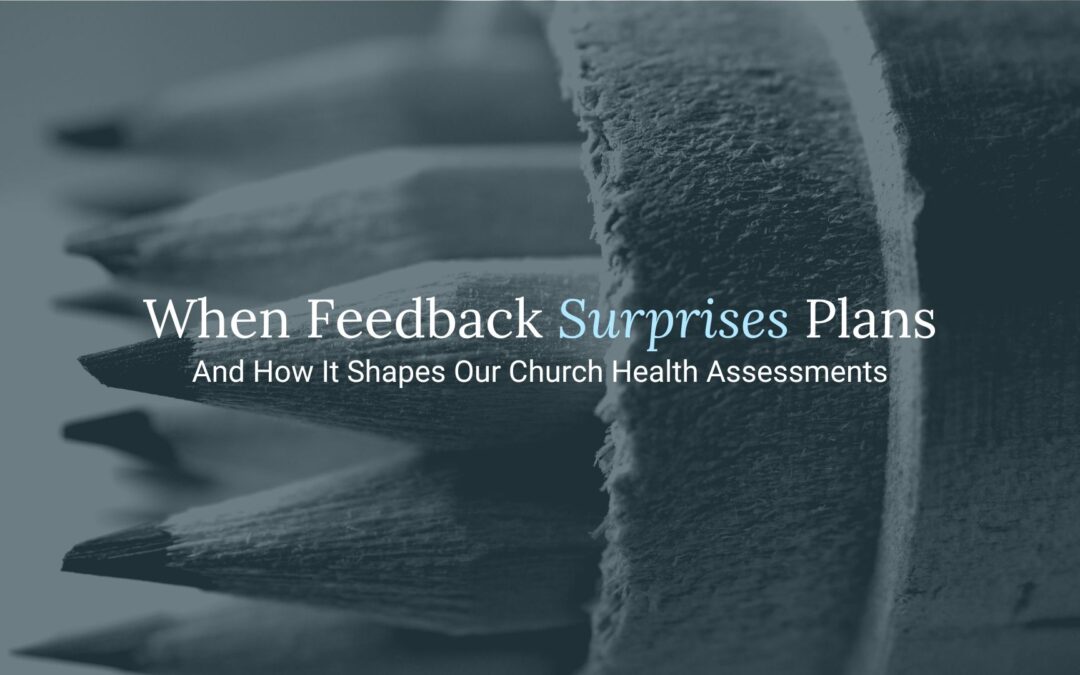
When Feedback Surprises Plans
And How It Shapes Our Church Health Assessments
I had the perfect plan.
Color-coded. Carefully budgeted. The perfect five-month rollout that tied together leadership development, discipleship groups, and even a new volunteer onboarding pathway. I had charts. I had buy-in. I had the whole thing laid out like a well-prayed-over blueprint.
And then it unraveled—beautifully.
Not in a catastrophe, but in the way that only real ministry can undo you. A new believer asked a question I couldn’t answer. A seasoned leader quietly confessed he didn’t feel equipped to lead anymore. A team that looked solid on the outside was quietly struggling on the inside.
None of these realities had a column in my spreadsheet.
The Myth That “More Planning” Fixes Everything
For most of my ministry life, I operated under the quiet assumption that the better my planning, the better the outcomes. Tight timelines, clear expectations, detailed to-do lists—these were the hallmarks of “faithful stewardship” in my mind.
And don’t get me wrong: planning is a form of stewardship.
But over time, I started to see the cracks.
Because ministry isn’t a machine—it’s a garden.
And people aren’t programs—they’re living, breathing souls.
No matter how much data you gather or how well you design your strategy, people don’t always behave according to the plan. And that’s not a failure. That’s ministry.
Why Our Approach to Church Health Assessments Looks Unique
That realization changed not just my philosophy—it shaped how we now approach strategic implementation for every Church Health Assessment we offer.
When a church team partners with us, we start with a robust map:
- We gather extensive data.
- We analyze patterns.
- We identify clear pathways for growth.
The plan is real, intentional, and based on real evidence.
But—and this is critical—we plan in pencil.
Because we know:
Churches are not binary systems.
People aren’t predictable formulas.
Ministry demands flexibility because the Spirit moves in living hearts, not flowcharts.
That’s why when we walk alongside an implementation team, we don’t just drop a static action plan and walk away. We build feedback loops right into the process. Regular check-ins. Team reflections. Space for discernment. Flexibility to pivot when real life demands it.
We steward the data seriously—but we steward the people even more seriously.
How Feedback Makes the Plan Stronger
If there’s one thing we’ve learned, it’s this:
Plans give you a direction. Feedback gives you discernment.
Our strategic implementation model lives in the tension between the two.
We don’t swing to either extreme:
- We don’t throw out planning and “wing it”—that would be unfaithful.
- But we also don’t cling to a rigid plan so tightly that we miss what God is actually doing on the ground.
Instead, we move forward wisely, intentionally, but with open hands.
We ask key leaders reflective questions along the way.
We revisit strategies based on new realities.
And through it all, we remind ourselves: the goal isn’t to stick to the original map at all costs.
The goal is health. Growth. Flourishing. Gospel movement.
And those things don’t always follow our timetables.
Ministry Leaders, Here’s What I Hope You Hear
You don’t have to stop planning.
You don’t have to distrust data.
You don’t have to feel like needing to adjust means you did something wrong.
But I encourage you—whether you’re navigating a Church Health Assessment implementation or just stewarding the daily life of your church:
Plan in pencil.
Leave room for grace, for feedback, for surprising growth.
Because in ministry, faithfulness isn’t measured by how closely we stick to the original plan.
It’s measured by how closely we follow the Spirit’s leading—step by faithful step.
If your church is entering a season of strategic reflection or feeling the need for a fresh, Spirit-sensitive pathway toward health, we would be honored to walk that road with you, with a real plan, real flexibility, and a deep respect for the people God has entrusted to you.

